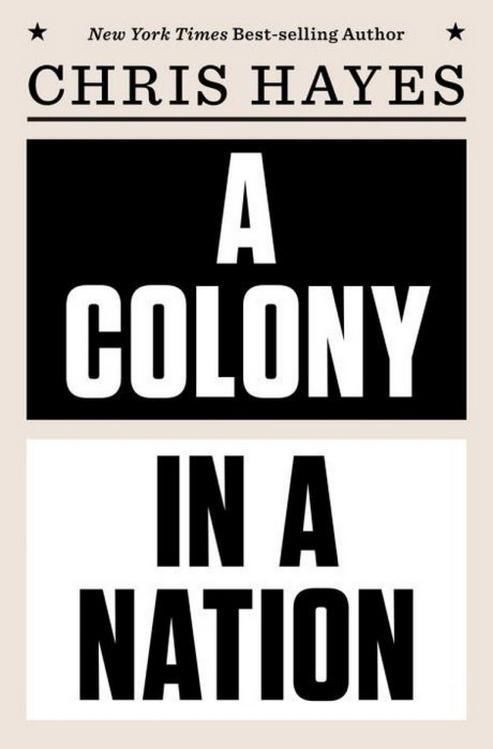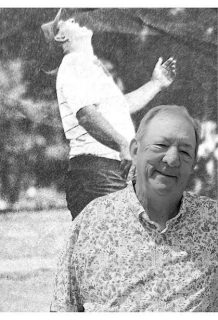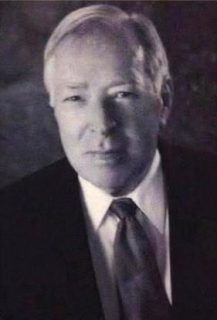Book review: ‘A Colony in a Nation’
Published 12:00 am Sunday, October 1, 2017

- Book review: 'A Colony in a Nation'
“A Colony in a Nation” by Chris Hayes. New York: W.W. Norton & Co., 2017. 256 pages, $26.95.
“The United States is the most violent developed country in the world,” Chris Hayes notes near the beginning of “A Colony in a Nation,” his new examination of the relationship between race and crime in America. “It is also the most incarcerated. For more than four decades the second problem has grown, often under the guise of addressing the first. While the country’s homicide rate has fallen sharply from its peak, it remains higher than that of any other developed democracy, sandwiched between Estonia and Chile in international rankings.
Trending
“America imprisons a higher percentage of its citizens than any other country, free or unfree, anywhere in the world, except the tiny archipelago of Seychelles,” he continues. “The total number of Americans under penal supervision, some have argued, even rivals the number of Russians in the gulag under Stalin. Nearly one out of every four prisoners in the world is an American, though the United States has just 5 percent of the world’s population.”
“A Colony in a Nation” is relatively well-researched, with 18 pages of source notes at the conclusion of the six chapters that comprise the main text. The literary style is fluid and engaging; Hayes is a natural storyteller who knows how to make a point without belaboring the issue or keeping the narrative at a superficial level. More than anything else, the book is a very eye-opening, cautionary treatise that needs to be read by as many people as possible.
At the heart of Hayes’ thesis is the notion that contemporary American society is currently divided into two distinct camps. First, there is the “Nation,” where the rule of law is held in absolute esteem. This characterization obviously appeals to many citizens, especially those who espouse the idea that the United States is deeply rooted in an almost absolute reverence for “law and order.” Those who hold this belief, according to the author, are cut from the same cloth as those who elected Richard Nixon in 1968, in part because he was seen as someone who could bring an end to the social activism of the 1960s that inspired some and terrified others.
By comparison, the “Colony” embodies an almost irrational obsession with maintaining order through any means possible; i.e., those who value conformity more than individualism and, as such, are willing to sacrifice civil rights and severely restrict civil liberties. Taken collectively, the ideologies and mindsets represented by “Nation” and the “Colony” inevitably, according to Hayes, set the stage for what happened in communities such as Ferguson, Mo., and West Baltimore. Fear, it seems, can cause us to make a series of decisions that have unfortunate but completely predictable consequences – consequences we are often unable to recognize or appreciate until the circumstances they invariably precipitate are virtually irreversible.
Harboring an empathetic bias infused with meticulous detail, Hayes traces the precipitous increase in crime that began in the 1960s and continued well into the 1990s. He discusses the reasons for this phenomenon and uses the contributing factors – which are obvious once pointed out – as a backdrop from which to explain the unprecedented decline in lawlessness that has occurred during the past two decades. He then contrasts this well-documented decrease in criminal activity with the equally extraordinary increase in incarceration rates for particular groups.
“Issa Kohler-Hausmann, who’s done some of the most thorough empirical work on New York City’s ‘quality of life’ arrests, notes that while arrests for low-level offenses skyrocketed, the actual rate of criminal convictions dropped,” Hayes explains in reference to an infamous but inherently flawed philosophy of urban governance that emerged in the early 1980s. “She argues that ‘broken windows’ actually created a parallel court system, with an altogether different set of goals. In other words, New York constructed an entire judicial system around low-level offenses. The goal of this system is not to figure out if the person in question committed a crime but to sort city residents according to their obedience and orderliness. So expansive is this system of misdemeanor sorting that in a city that’s 80 percent less violent than it was two decades ago, the NYPD makes thousands of arrests a year of people who are doing things like selling M&Ms on the subway. Similar explosions of small-infraction misdemeanor citations and summons happened across the country, from New York to Chicago to Los Angeles to Ferguson.”
Trending
Hayes has a B.A. degree in philosophy from Brown University, where he was also a member of “Production Workshop,” a student theater group. Before assuming his current duties as host of “All In With Chris Hayes” on MSNBC, he was the host of “Up with Chris Hayes,” which aired on Saturday and Sunday mornings. In addition to his work as a TV host, his resume includes stints as the Washington editor for The Nation, an adjunct professor of English at St. Augustine College in Chicago and as a Bernard L. Schwartz fellow at the New America Foundation. “A Colony in a Nation” is his second book; the first being “Twilight of the Elites: America After Meritocracy,” which was published in 2012.
In the final analysis, Hayes asserts that the desire to maintain order in the United States has slowly but surely eclipsed the need to maintain the rule of law. The root problem with this approach is that order tends to mean one thing to one group of people while having an entirely different connotation to other groups. Once again, the driving force behind this growing dichotomy seems to be fear – and a seemingly insatiable need to punish those who do not conform to the behavioral and attitudinal norms established by those in positions of power.
“America is a wrathful land,” he concludes near the end of the book. “Americans like to humiliate wrongdoers. We like to heap marks of shame upon them, to watch them groan and writhe beneath their sins, as far back as the scarlet letter and the stocks. We like, in short, to punish. It makes us feel good.”
I believe Hayes is on to something significant. If you truly want to understand what’s happening in our country, pick up a copy of “A Colony in a Nation.” It doesn’t disappoint.
– Reviewed by Aaron W. Hughey, Department of Counseling and Student Affairs, Western Kentucky University.






